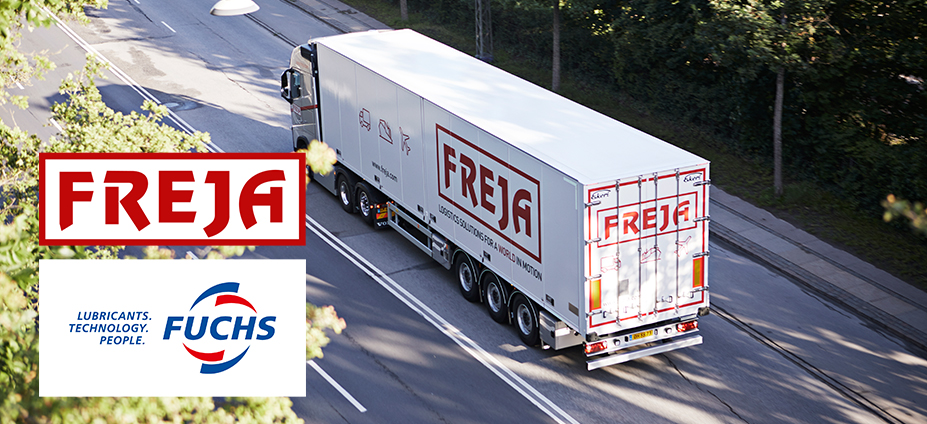Optimised sustainability work between FUCHS and FREJA
The more we engage in and learn about sustainability work, the greater the insight we have into the area’s complexity. Anyone wishing to take their responsibility and do what they can to reduce climate impact has a lot of different aspects to consider – and we have come to realise that the best results call for collaboration with others. One example is FUCHS’ collaboration with transport and logistics company FREJA.

If you want full focus on sustainability work, you have to consider the entire process and value chain. Transport and raw material purchase, for example, account for a very large part of FUCHS’ emissions, so it’s important to find working relationships with others who want to develop in the same direction. FREJA currently transport goods daily from the FUCHS warehouse in Västerhaninge, outside Stockholm, to our Nordic neighbours.
While the whole transport sector struggles to reduce its climate impact, FUCHS and FREJA have already made great progress in their sustainability efforts. The first major step is our daily transports between Stockholm and Norwegian capital Oslo, which run on HVO100.
So what’s HVO100?
HVO stands for Hydrotreated Vegetable Oil, an advanced, renewable fuel for diesel engines. It is often used mixed in with regular diesel to reduce environmental impact, and HVO100 means the fuel is 100% renewable.
Although we talk about Hydrotreated Vegetable Oil, HVO100 can in fact be made from both vegetable oils (such as rapeseed and pine oil) and animal fats (from, for example, the abattoir and fishing industry). Under the EU’s Renewable Energy Directive, HVO100 may not contain oils from sources that could be used for food production, or oils from sources that affect the environment (such as palm oil). It is however allowed to use residual products from the production of palm oil (such as PFAD).
“With HVO100 in our fuel tanks, we can reduce carbon dioxide emissions by 90% compared to regular diesel,” says Søren Skive, EVP Management for FREJA Sweden. “It also reduces particle pollution and particle emissions.”
Optimised sustainability requires more than HVO100
But genuinely minimising climate impact and optimising sustainability from transport is about far more than the fuel you use. For FUCHS and FREJA, using HVO100 in all FREJA transports is only the beginning. We have also looked at everything from the trucks we use to optimising loads. And it is definitely paying off.
“By also looking at the vehicles we use, and how we load them, we’ve managed to halve the volume of transport on the Norway run without reducing our service level to customers,” says Magnus Stolt, Senior Manager Warehouse & Distribution at FUCHS Sweden. “We used to send two lorries a day to Norway, but now we can manage with one. And we can see that it’s making a big difference – a difference that will be even bigger once we’re fully up and running in Denmark as well.”
So there’s no doubt that load optimisation combined with HVO100 makes a difference. According to previous theoretical studies, this year FUCHS should have reduced CO2 emissions by 200 tonnes with the new Oslo setup, but it looks like being as much as 250 tonnes.
“Looking at what we call ‘from tank to wheel’, with our 50% reduction in transport, I’m proud to say we now have zero carbon dioxide emissions on the Norway route,” Stolt continues. “And looking at the total, what we call ‘from well to wheel’, which includes all emissions from petroleum extraction and processing to distribution and combustion in vehicles, we’re talking about a reduction on the route of 90%.”
“And that’s after only working together for just over a year,” adds Søren Skive, “although it was clear we were on the same page even in the procurement phase. We clicked immediately, and I feel we have an interesting, dynamic process with people who are just as focused on reducing environmental impact as we are. FUCHS has never been just about price, but about thinking long term.”
“Well that’s certainly true, but carbon dioxide emissions and freight costs undeniably go hand in hand. Because although HVO100 is a more expensive fuel, we earn that back from halving the volume of transport,” says Stolt. “I really appreciate the collaboration that has brought us where we are today. Søren has a positive, responsive attitude, and his many years in the industry help to achieve consensus. I also think that the stiff competition for procurements in Norway has acclimatised FREJA to analysing customers’ needs from the word go. Their analytical capabilities made them stand out from the crowd.”
The work continues
The challenges and the dialogue continue with weekly discussions. The next country in line is Denmark, where a process is also under way to find the best solutions for local distribution – what we call ‘the last mile’ – as soon as possible.
“We’re looking closely at investing in electric vehicles,” says Skive, “a solution that’s also likely to spread to the neighbouring countries – after Norway and Denmark, it’s the turn of Sweden and Finland. We’re also looking at incoming freight from Europe.”
Do you have any ideas?
Our goal at FUCHS is to continue improving sustainability throughout our entire process and value chain – and we see new kinds of collaboration as a key part of this process. We realise we have to help each other if we’re to succeed in bringing about a sustainable world. So, if you have an idea for a collaboration project, something that would take us a step closer to the sustainability goals in our sector, please don’t hesitate to get in touch.